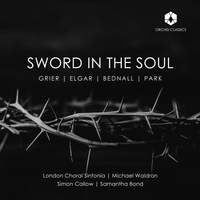Video Interview,
Michael Waldron on Sword in the Soul
Amid the annual flurry of recordings of the great Passion settings and Lenten repertoire in the runup to Easter, Sword in the Soul stood out - it's a contemporary setting of six varied texts for choir, cello and organ, interspersed with readings by the former Archbishop of Canterbury, Rowan Williams - in which his keen sense not just for turns of phrase but for grippingly direct moral challenges is evident. The music, too, pulls no punches, with movements ranging from veneration to barely-contained fury to outpourings of grief.
Yet it's been hidden in plain sight for decades; written in the early 1990s, Francis Grier's searing music languished in a disordered organ loft until rediscovered by Michael Waldron in 2006, and has captivated him ever since. The first revived performance ensued in 2010, and now Michael has at last been able to realise a long-held dream by recording Sword in the Soul alongside choral works by Park, Bednall and Elgar. He was kind enough to record a few thoughts for us; the transcript is below.
London Choral Sinfonia, James Orford, Brian O'Kane, Samantha Bond (narrator), Simon Callow (narrator), Adrian Peacock (narrator), Samuel Pantcheff, Alison Ponsford-Hill, Michael Waldron
Available Formats: CD, MP3, FLAC, Hi-Res FLAC, Hi-Res+ FLAC
How did Sword in the Soul end up lost and forgotten for nearly three decades? Honestly, I don't know! I gather it was written quite speedily following the BBC commission, so it wasn't actually published at the time it was broadcast. Perhaps the moment had just passed after it was first premiered, and it's simply been forgotten about. Was a recording always part of the plan? Ever since I heard the score, I knew I'd always love one day to perform, and maybe record, the work in its entirety. And when LCS began discussing the possibility of an Easter/Passiontide disc, I knew it would be the perfect opportunity to include Sword in the Soul. Why is Elgar's For the Fallen such a relative rarity? For the Fallen is, of course, the final movement of Elgar's larger-scale work The Spirit of England. It's a piece I'm extremely fond of, and have been fortunate enough to conduct a couple of times. Although no-one could doubt the integrity of the music, I do wonder if the piece has suffered slightly because of the texts. Certain parts of the text feel a little bit dated to modern ears, and because of the fact that it's so inextricably linked to the Great War, it's probably suffered in its popularity. I also think there are practical elements at play. It's a very large orchestra, it's a demanding part for the chorus and the soloists, and with a total running time of only about twenty-five minutes it means it presents certain difficulties programming in a concert. All this being said, Ian Tracey's We Shall Remember Them adapts material from the corresponding setting of Elgar's piece With Proud Thanksgiving which, although an independent piece, is directly drawn from For the Fallen. The use of the orchestra is so minimal at this point that its absence is really scarcely noticed. The result forms a very small but beautiful unaccompanied piece which derives entirely from Elgar's original. Did you consider an orchestral version of Sword in the Soul? The way Francis Grier scored the music creates a very special, and I would say unique, soundworld. He uses the organ quite sparingly; for example, in the first and last movements it plays for only about three or four bars, and in one movement it doesn't even play at all. The solo cello, however, plays an extremely important part throughout almost every movement. Against the dense and very rich choral textures, this really allows the two instruments to be deployed with great effect. I suspect an orchestral adaptation would actually take away and detract somewhat from the intensity and immediacy that this scoring creates. Were Rowan Williams's readings conceived as part of the original work, or could it be performed with other meditations? Yes, Rowan Williams's readings were conceived as part of the original work; in fact, I understand that the text came first, and Francis Grier was commissioned to write seven musical numbers to intersperse between them. That being said, the musical numbers are actually all self-contained, with varied and contrasting moods, and I believe could certainly work with other meditative texts, be they sacred or secular, interspersed between them.



